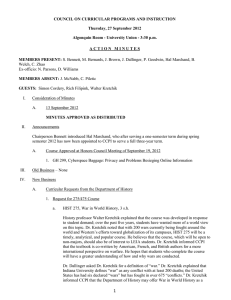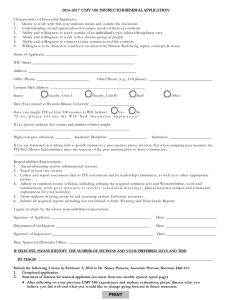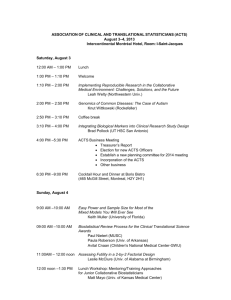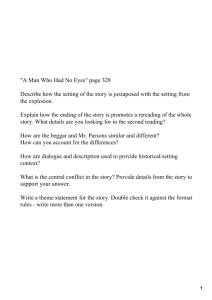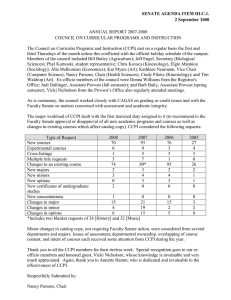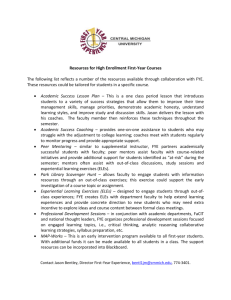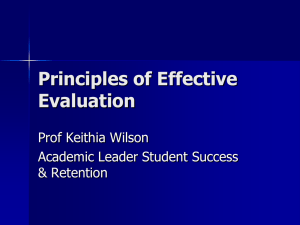COUNCIL ON CURRICULAR PROGRAMS AND INSTRUCTION Thursday, 13 September 2012
advertisement
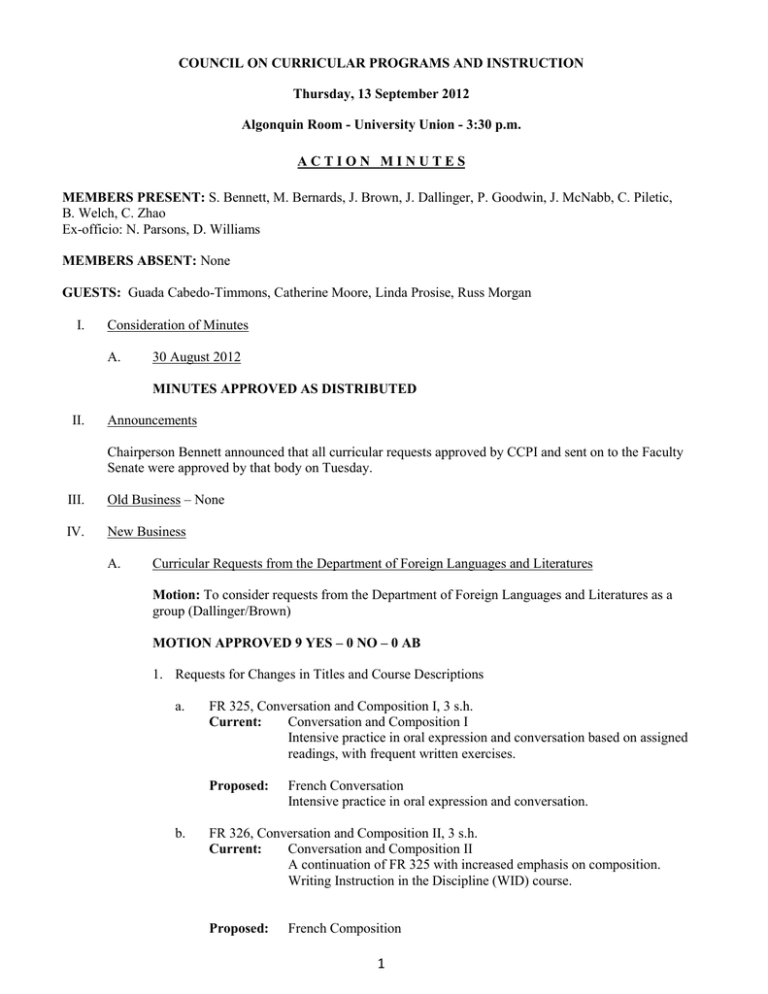
COUNCIL ON CURRICULAR PROGRAMS AND INSTRUCTION Thursday, 13 September 2012 Algonquin Room - University Union - 3:30 p.m. ACTION MINUTES MEMBERS PRESENT: S. Bennett, M. Bernards, J. Brown, J. Dallinger, P. Goodwin, J. McNabb, C. Piletic, B. Welch, C. Zhao Ex-officio: N. Parsons, D. Williams MEMBERS ABSENT: None GUESTS: Guada Cabedo-Timmons, Catherine Moore, Linda Prosise, Russ Morgan I. Consideration of Minutes A. 30 August 2012 MINUTES APPROVED AS DISTRIBUTED II. Announcements Chairperson Bennett announced that all curricular requests approved by CCPI and sent on to the Faculty Senate were approved by that body on Tuesday. III. Old Business – None IV. New Business A. Curricular Requests from the Department of Foreign Languages and Literatures Motion: To consider requests from the Department of Foreign Languages and Literatures as a group (Dallinger/Brown) MOTION APPROVED 9 YES – 0 NO – 0 AB 1. Requests for Changes in Titles and Course Descriptions a. FR 325, Conversation and Composition I, 3 s.h. Current: Conversation and Composition I Intensive practice in oral expression and conversation based on assigned readings, with frequent written exercises. Proposed: b. French Conversation Intensive practice in oral expression and conversation. FR 326, Conversation and Composition II, 3 s.h. Current: Conversation and Composition II A continuation of FR 325 with increased emphasis on composition. Writing Instruction in the Discipline (WID) course. Proposed: French Composition 1 Intensive practice in written expressions and composition. Writing Instruction in the Discipline (WID) course. c. SPAN 325, Spanish Conversation and Composition I, 3 s.h. Current: Spanish Conversation and Composition I Intensive practice in oral expression and conversation based on assigned readings, with frequent written exercises. Proposed: d. Spanish Conversation Intensive practice in oral expression and conversation. SPAN 326, Spanish Conversation and Composition II, 3 s.h. Current: Spanish Conversation and Composition II A continuation of SPAN 325 with increased emphasis on composition. Writing Instruction in the Discipline (WID) course. Proposed: Spanish Composition Intensive practice in written expressions and composition. Writing Instruction in the Discipline (WID) course. Motion: To approve the requests from the Department of Foreign Languages and Literatures (Welch/McNabb) Dr. Cabedo-Timmons explained that native speakers of French or Spanish do not really need 325 but may need more writing while other non-native speakers need additional practice in conversation. The department wishes to separate 325/326 and focus on conversation in 325 and composition in 326. Dr. Piletic asked if students will be allowed to take 326 but not take 325 if they are fluent in the language; Dr. Cabedo-Timmons responded affirmatively. She added that FR/SPAN 326 is a WID course, so a lot of students majoring in those languages will have to take it. Changes: Change chair designation at top of page to match signature of chair. Russ Morgan, who served as interim chair, signed some of the requests while new chair, Gary Schmidt, signed others. Change “expressions” to “expression” in the proposed course descriptions for both 326 requests. MOTION APPROVED WITH CHANGES 9 YES – 0 NO – 0 AB B. Recommendations for Revision of the First Year Experience (FYE) Program Interim Associate Provost Nancy Parsons reminded CCPI that a review of the FYE program began last spring and concluded with four public meetings with faculty and students and one meeting with Faculty Senate. She stated that the FYE Review Committee, now the FYE Leadership Committee, has presented its recommendations, which are being taken to CAGAS, the Council on General Education (CGE), and CCPI and will be taken to Faculty Senate. Dr. Parsons pointed out the biggest changes include requiring one traditional general education/pre-professional FYE course along with a UNIV 100 course rather than the previous two FYE course requirement. Both courses would be taken during students’ first semester at Western, which will usually be fall semester; last year there were 104 sections of FYE courses in the fall semester and 80 in the spring semester. The proposed UNIV 100 transition course will utilize a common textbook and syllabus, but the common reading formerly required of FYE students has been eliminated. Dr. Parsons stated that one option being considered for the textbook is a $29 three-ring binder. Professors in the traditional FYE classes will be provided with the 2 syllabus for UNIV 100 in case they wish to introduce or reference some of those topics in their classes as well. Dr. Parsons stated the logistical issues of how to use the 1 s.h. UNIV 100 transition course in the curriculum are ones that she would like to see CCPI discuss: Option 1: include UNIV 100 as a Human Well-Being Gen Ed requirement in its current format by adding a fifth grouping from which to choose courses; Option 2: include UNIV 100 as a Human Well-Being Gen Ed requirement by requiring an additional hour of University General Education (increasing it from 43 s.h. to 44 s.h.); Option 3: include UNIV 100 as a Communication Skills Gen Ed requirement by requiring an additional hour of University General Education; Option 4: revise UNIV 100 to a 0 s.h. course with S/U grading; Option 5: add 1 s.h. to graduation requirements. Dr. Parsons pointed out that adding 1 s.h. to students’ graduation requirements would likely result in programs reducing their general electives by one hour; the question was raised whether each of these program changes would have to go to CCPI and Faculty Senate. She explained that the Human Well-Being requirement can be met by taking 3 s.h. of specified coursework from two different departments: Dietetics, Fashion Merchandising and Hospitality, Kinesiology, Health Sciences, or Recreation, Park and Tourism Administration. Dr. Parsons has asked the Registrar to determine how many students fulfill this requirement by taking more than 3 s.h., and Ms. Williams stated that the office is very close to having the programming to provide that information. The Registrar has also been asked to determine how departments and programs would be affected by adding a 1 s.h. graduation requirement. Dr. Parsons stated that some conversations have also concerned whether including UNIV 100 in the Human Well-Being category and requiring an additional 2 s.h. from one of the other departments (option #1) would create a hardship for some of those departments. Ms. Williams asked if the proposal includes a recommendation to make a distinction between new freshmen and those students who have already taken 12-24 s.h. elsewhere. Dr. Parsons responded there will be a distinction but the decision has not been made whether to recommend that these students take UNIV 100 or the traditional FYE course. Dr. McNabb, who serves on the FYE Leadership Committee, stated that at its last meeting there was discussion about re-thinking entrance into FYE based purely upon semester hours since many students enter Western with several hours of AP or dual enrollment courses without ever having attended a university. Dr. Welch asked if faculty will teach the UNIV 100 transition courses. Dr. Parsons responded the UNIV 100 courses are currently taught by advisors, but could be taught by faculty, staff, secondyear master’s students in College Student Personnel or other interested individuals. An application process has been discussed. Dr. Parsons informed CCPI that FYE was originally built from Academic Affairs and Student Services; the FYE Leadership Committee is trying to infuse FYE across the campus by continuing to include these two divisions as well as advisors. She explained that some departments were previously given FYE faculty positions designated as F101 or F102; those designations have now been removed and the instructors can teach within their departments wherever necessary. Dr. Parsons added that whoever teaches the UNIV 100 transition courses will have specific training. Dr. McNabb asked if the 1 s.h. student credit hour production generated by teaching UNIV 100 would be credited to a faculty member’s department. Dr. Parsons replied she does not know, but this would be a good topic to explore. Dr. Parsons informed CCPI that option #1 has been the most popular so far in her discussions with Senate councils; this option would not increase General Education requirements or add an additional hour to majors, although it may affect some departments offering courses in the Human Well-Being category; Dr. Piletic predicted it would result in the loss of students for Kinesiology. Dr. Parsons noted that option #2, which would add a one-hour requirement to Human Well-Being, would affect incoming sophomores as well as first semester freshmen because everyone would have to take 4 s.h. of Human Well-Being even if they were not required to take UNIV 100. Dr. Parsons 3 stated that in discussions with the Departments of Communication and English/Journalism, the Communication Skills category of Gen Ed does not seem the right place for the transitional UNIV 100 course because it covers many more skills than just communication. Dr. Morgan stated that some majors at Western have no open electives and are already over 120 s.h. so would have an especially hard time adding another 1 s.h. requirement; he noted that teacher education programs are at 145 s. h. already and may have to increase in a couple of cases because state standards are again changing. Dr. Welch asked if the revisions will change the number of courses offered in departments; Sociology and Anthropology, for instance, has many 100-level courses because of the FYE requirement. Dr. Parsons observed that students will still need those courses to satisfy General Education; she stressed that no faculty will lose a job and no furloughs are planned as a result of the FYE changes. Dr. Piletic asked if teaching assistant positions might be lost, noting that in Kinesiology the 100-level classes are taught by TAs. She stated that if UNIV 100 is placed within the Human Well-Being category and students no longer choose Kinesiology classes to fulfill that requirement, it will impact TA loads. Dr. Parsons stated that the Committee has not considered the effect on TA positions. Chairperson Bennett asked what options were preferred by the other Senate councils. Dr. Parsons responded that CGE preferred options 1, 2, or 5; CAGAS did not express a preference, but neither council wanted option #4. She stated options #1 or #2 would have to be approved by CGE, and there are some concerns as to whether UNIV 100 is really a Gen Ed course; option #5 would have to be approved by CAGAS. Chairperson Bennett asked how the decision would be made. Dr. Parsons responded she is gathering input to bring back to the FYE Leadership Committee who will decide which recommendation to bring to Faculty Senate. Dr. Piletic stated that if the University sees UNIV 100 as a viable course, it should be made a graduation requirement to show that Western thinks it is important. Ms. Williams observed that great effort has been exerted in the past to make sure that native WIU students are treated the same as transfer students, and this should be kept in mind when determining how UNIV 100 will be required. CCPI members stated their individual preferences for various options. All appeared to agree that #4, revise UNIV 100 to a 0 s.h. course with S/U grading, is not a viable option. V. Provost’s Report – None Motion: To adjourn (McNabb) The Council adjourned at 4:30 p.m. Cindy Piletic, CCPI Secretary Annette Hamm, Faculty Senate Office Manager 4
